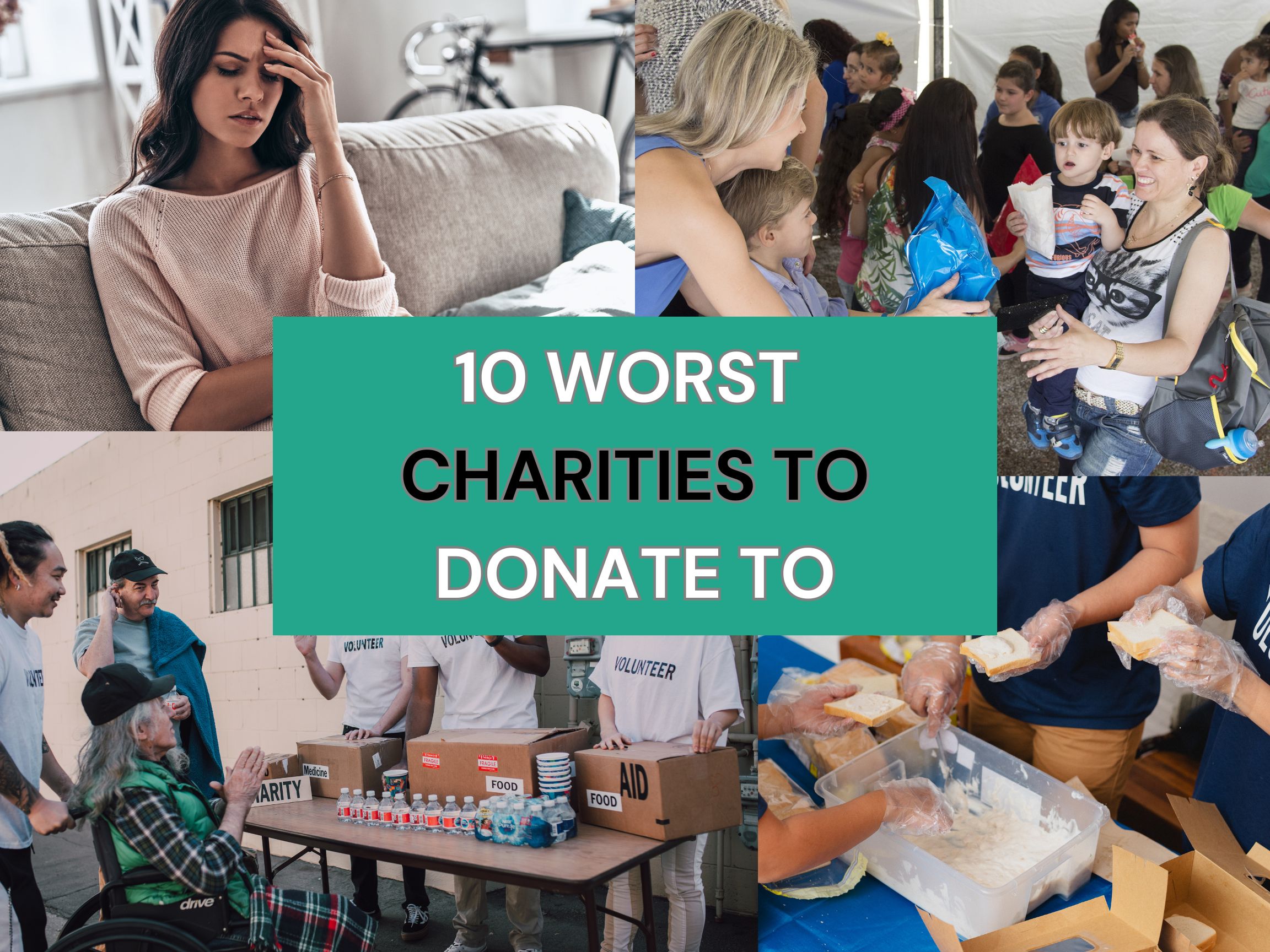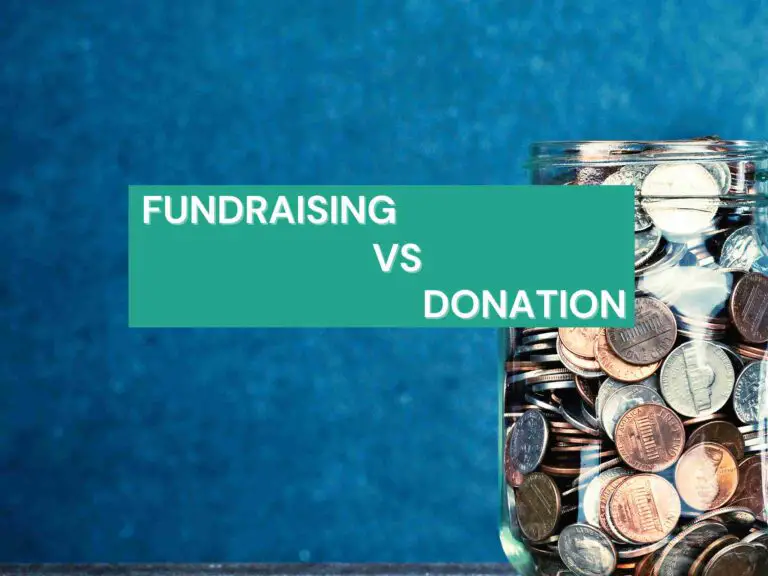10 worst Charities to donate to (And How to Avoid Getting Scammed)
This post may contain affiliate links. If you purchase through one of these links, I may receive a small commission at no extra cost to you. As an Amazon Associate, I earn from qualifying purchases.

Are you looking to make a difference with your charitable giving but worried about where your money goes? This comprehensive guide will help you identify the worst charities to donate to and equip you with the knowledge to make informed, impactful decisions.
When you choose to donate to a charity, you’re offering more than just financial support; you’re extending trust, empathy, and hope. The powerful belief that your contribution will create a tangible, positive difference is the driving force behind millions of generous acts every year.
But what happens when your hard-earned money doesn’t reach the people or causes you intend to help?
Unfortunately, not all charitable organizations operate with the efficiency or integrity we expect. Some are shockingly inefficient, funneling donations away from their stated missions. Others are outright fraudulent, preying on the goodwill of donors. Many employ emotionally manipulative tactics to solicit funds, only to direct the vast majority of those donations towards excessive executive salaries, aggressive telemarketing campaigns, or endless “fundraising” efforts that yield little real-world impact.
This guide serves as your essential resource, offering a deep dive into some of the most criticized and lowest-rated charities in the United States. These aren’t just instances of minor mismanagement; many of these organizations have faced public exposure for deception, have been sued by government bodies, or have drawn widespread condemnation from multiple reputable charity watchdogs.
Key Takeaways
Be aware that not all charities are trustworthy, as some are inefficient or fraudulent, misusing donations.
Recognize red flags like a lack of transparency, high executive pay, pushy tactics, or misleading names.
Always vet charities using resources like Charity Navigator before donating.
What Makes a Charity “Bad”?
Before we delve into the specific organizations, it’s crucial to establish a clear understanding of what constitutes a “worst charity.” A problematic charity typically exhibits one or more of the following red flags:
- Spends more on fundraising and salaries than programs: A significant portion of donations is diverted to administrative overhead and fundraising expenses rather than directly supporting the intended beneficiaries or programs.
- Lacks transparency and does not release audited reports: The organization is unwilling or unable to provide clear, independently audited financial statements that show how funds are being used.
- Has been fined, sued, or shut down for fraud: There’s a history of legal action or regulatory intervention due to deceptive practices or outright fraud.
- Uses high-pressure tactics to guilt-trip donors: Aggressive or emotionally manipulative fundraising strategies are employed, often making donors feel obligated to give.
- Confuses donors by mimicking reputable organizations: The charity uses a name, logo, or mission statement that is intentionally similar to well-known, legitimate charities, leading to mistaken donations.
Reputable watchdogs such as Charity Navigator, CharityWatch, and the Better Business Bureau’s Wise Giving Alliance consistently publish ratings that assess charities based on their financial efficiency, transparency, and governance. If an organization consistently receives low scores or refuses to disclose essential financial information, these are significant warning signs that should prompt caution.
The 10 worst charities to donate to
Here are some of the worst charities to donate to that have raised serious concerns among watchdogs and investigative journalists:
1. Kids Wish Network
At first glance, Kids Wish Network might appear to be a legitimate counterpart to the well-regarded Make-A-Wish Foundation. However, extensive investigative journalism, notably by CNN and the Tampa Bay Times, has revealed a troubling reality: less than 3 cents of every dollar donated goes towards benefiting children.
Over a decade, more than $100 million in donations were reportedly spent on for-profit fundraisers and administrative costs. Despite these revelations, the organization continues to solicit donations nationwide.
This charity has a zero-star rating on Charity Navigator.
2. Cancer Fund of America
This organization, which deceptively marketed itself as a charity, was a central figure in a massive FTC fraud case in 2015. The case exposed over $187 million in deceptive donations across a network of related charities. The Cancer Fund of America, led by James Reynolds Sr., falsely promised to provide aid to cancer patients. In reality, the vast majority of its funds were squandered on executive perks, luxury items, and endless fundraising activities. Ultimately, the charity was shut down, and its operators were permanently banned from engaging in fundraising activities.
Related Articles:
9 Best Charities for Child Labor That Make A Difference 2023
9 Trusted Charities That Help Single Mothers to Donate To
9 Best Charities for Women’s Mental Health
3. American Breast Cancer Prevention Foundation
The American Breast Cancer Prevention Foundation has been consistently flagged by prominent charity watchdogs like Charity Navigator and CharityWatch. Their primary concern is that a disproportionate amount of the ABCF’s funds are spent on fundraising contractors rather than on direct patient assistance.
While the ABCF claims to facilitate mammogram access for women, watchdogs report a lack of clear breakdowns regarding program outcomes, and their CEO has faced criticism for receiving excessive compensation.
This charity has no rating on Charity Navigator.
4. Firefighters Charitable Foundation
If you’ve ever considered donating to the Firefighters Charitable Foundation with the belief that you’re supporting heroic firefighters and their families, it’s important to reconsider. Reports indicate that less than 10% of the money donated actually goes towards any fire-related causes or aid. The overwhelming majority of funds are absorbed by external fundraising firms.
This charity serves as a classic example of “name manipulation,” leveraging emotionally resonant branding to attract donations while providing minimal, if any, support to the very people it purports to serve.
This charity has a zero-star rating on Charity Navigator.
5. Children’s Wish Foundation International
Many donors often confuse Children’s Wish Foundation International with the widely recognized and highly reputable Make-A-Wish Foundation. However, these two organizations are entirely separate and unrelated. Children’s Wish Foundation International has been exposed for directing most of its funds towards telemarketing and administrative expenses, leaving only a small fraction for actual wish-granting activities. It exploits the public’s goodwill and compassion for terminally ill children without delivering on its promises at a meaningful scale.
This charity has a two-star rating on Charity Navigator.
6. International Union of Police Associations (IUPA)
This organization presents a unique challenge for donors. The IUPA is fundamentally a union, not a registered charity. However, it employs fundraising strategies that closely mimic those of a nonprofit organization.
Donors contribute under the impression that their money will directly assist police officers and their families, but these funds are primarily channeled back into the union’s operational budget. A particularly concerning aspect is its use of for-profit telemarketers, who are sometimes allowed to retain up to 90% of the donation revenue.
This charity is not mentioned on the Charity Navigator.
7. For the troops
“For the Troops” aims to provide care packages to military personnel, a mission that deeply resonates with many donors. However, this organization has drawn criticism from charity watchdogs for its operational inefficiencies, suggesting it may not be the most effective destination for your charitable contributions.
CharityWatch has assigned “For the Troops” an F rating, indicating that a significant portion of its funds does not directly support its programs. Half of its spending reaches the intended beneficiaries. Furthermore, the organization faces criticism for its high fundraising costs, reportedly spending $74 to raise every $100. A notable red flag is the absence of an independent audit for its recent financial statements, which hinders transparency and accountability. While its goal is admirable, “For the Troops” demonstrates practices that may limit the actual impact of donor generosity.
This charity has one star rating on Charity Navigator.
8. The Committee for Missing Children
Operating out of Georgia, The Committee for Missing Children positions itself as an organization dedicated to addressing child abduction cases. Despite its stated mission, charity watchdogs have reported minimal tangible results, a significant lack of public accountability, and strikingly high executive compensation. There are almost no independently audited impact reports available, suggesting that most of the funds raised are used to cover operational costs rather than to directly assist missing children or their families.
This charity has one-star rating on Charity Navigator.
9. Feed the Children
“Feed the Children” aims to help people globally by supplying vital items like food and medicine. Despite this noble goal, the organization has a history of serious problems and inefficient spending, making it a poor choice for donations. CharityWatch has given “Feed the Children” a failing grade, an F, because a very small portion of the money it receives, only 18% of its cash funds, actually goes toward its programs. Instead, a large 60% of its cash budget is used up by costly advertising and mail campaigns to bring in more money.
This charity has also been involved in major scandals, including accusations of faking financial records, employee theft, and internal power struggles, even earning the title “The Most Outrageous Charity in America” in 2009.
10. Black Lives Matter Global Network Foundation
The Black Lives Matter Global Network Foundation, while dedicated to a profoundly important cause, has drawn significant attention for its financial practices, leading some to question its effectiveness as a charity. Independent evaluators, like CharityWatch, have assigned it a ‘D’ grade, indicating that a substantial portion of its cash donations has been directed toward administrative and fundraising efforts rather than directly funding its core programs.
Concerns have also emerged regarding the organization’s governance structure and the transparency of its financial reporting over time. These issues, including past challenges with state registrations and questions about how funds were managed, suggest that donors might find their contributions are not being utilized with the highest possible efficiency to advance the foundation’s stated goals.
Watch Out for These Red Flags
How can you effectively protect yourself from donating to the worst charities to donate to? Be vigilant and look out for these critical signs:
- Emotional language with no specifics: The charity’s appeals are heavily reliant on emotional manipulation but lack concrete details about how donations are used or the specific outcomes achieved.
- No published IRS Form 990: This is a public document that all legitimate 501(c)(3) non-profits are required to file, detailing their financial activities. Its absence is a major red flag.
- High CEO pay compared to budget: The chief executive’s salary appears disproportionately large relative to the organization’s overall budget or the amount spent on programs.
- Unclear mission or overlapping names: The charity’s mission is vague, or its name is intentionally similar to another, more reputable organization, leading to confusion.
- Pushy fundraising tactics (especially by phone): You experience aggressive, high-pressure, or guilt-tripping solicitations, particularly from telemarketers.
If a charity seems reluctant to provide audited financial statements or transparent impact reports, consider it a strong signal to withhold your donation and look elsewhere.
How to Vet a Charity Before You Give
To ensure your generosity makes a real difference, always take a few moments to research any charity before you contribute. Utilize these free and reliable tools:
- Charity Navigator: Provides star ratings based on a charity’s financial health, accountability, and transparency.
- CharityWatch: Offers letter grades and detailed financial breakdowns, focusing on how efficiently a charity uses its donations.
- GuideStar: A comprehensive source for IRS records, mission statements, and information about board members for millions of non-profits.
- BBB Wise Giving Alliance: Evaluates charities against 20 rigorous standards for charity accountability, helping you make informed giving decisions.
- IRS Exempt Organizations Search: A crucial tool to verify if an organization is indeed a valid 501(c)(3) tax-exempt entity.
Final Thoughts: Be a Smart Donor
Donating to a worthy cause should be an empowering experience, not one that leaves you feeling exploited or misled. While the vast majority of charitable organizations are well-meaning and effective, it only takes a few bad actors to erode public trust in the entire sector.
The most impactful actions you can take as a donor are:
- Research before you give: Never donate on impulse. Take the time to investigate.
- Focus on impact, not emotion: While empathy is a powerful motivator, base your giving decisions on a charity’s proven effectiveness and financial efficiency.
- Look for proof, not promises: Seek out concrete evidence of a charity’s work and its outcomes, rather than just relying on their claims.
Want to ensure your generosity creates a genuine, positive change? Consider supporting local grassroots organizations, direct mutual aid initiatives, or established nonprofits with consistently strong financial ratings and transparent operations. Your money and your kindness deserve to go where they will have the most profound and lasting impact.





